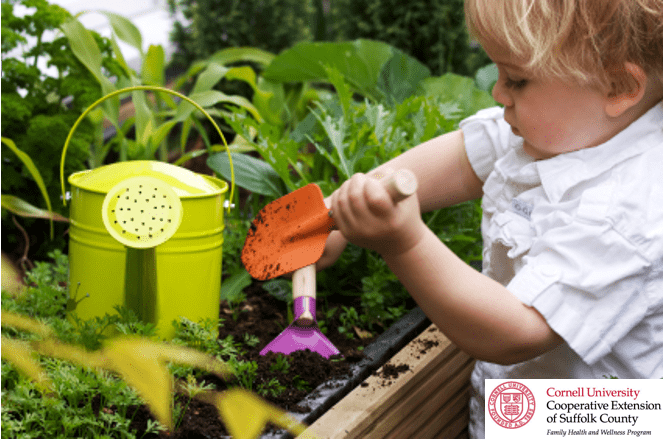By Elizabeth Takakjian
Gardeners know that their flower beds and vegetable gardens need regular watering to grow and flourish. Just how much water is enough? Well, according to the Diagnostic Lab staff at Cornell Cooperative Extension, that equals about an inch and a half of water each week. Installing a rain gauge is any easy way to keep track of the rainfall so that you can accurately judge how much supplemental watering your plants will need. In the garden, a good way to check soil moisture is by pushing aside the topmost layer of soil to look and feel if the soil damp below the surface. Much like you if you’ve been active or in hot weather, additional hydration may be needed to keep your plants flourishing in extreme heat and/or windy conditions. For those with automatic irrigation systems, conserve water by making sure your system isn’t running on rainy days, wasting a valuable resource.
Keeping your garden plants in optimal condition will have a positive impact on your health. Many fruits and vegetables, such as watermelon and tomatoes, are 90 percent or more water by weight. The Mayo Clinic asserts on average, that food provides about 20 percent of total water intake for most people. So getting the recommended daily servings of fruits and vegetables is a good start to keeping healthy and hydrated. Keeping an infusion container of water readily available will make getting the recommended amount of daily fluids delicious. Think about enhancing the flavor of your water naturally with fruits: lemons, blackberries, peaches and kiwis or vegetables and herbs: cucumbers, mints, lemon and/or basil. Other recommendations for safely flavored waters with less sugar can be found at the Nutrition Action link below. Keeping properly hydrated is easy if you start each meal with a satisfying glass of water and keep an environmentally friendly water bottle with you when you are in the garden or on the go. To calculate just how much water is enough for you, there are a number of hydration calculators available online and the Mayo Clinic link below provides useful insights into proper hydration for everyone.
Further Reading:
- Water: How much should you drink every day?
- Add flavor without excess calories and sugar or potentially dangerous additives
- CamelBack Hydration Calculator
Elizabeth Takakjian is a Program Educator with Cornell Cooperative Extension of Suffolk County’s Family Health and Wellness Program, as well as a Master Gardener. She can be reached at 631-727-7850 ext. 325 or at et344@cornell.edu.
